Following on from our last blog, we’re proud that we offer a fun, educational and safe environment at all of our classes.
While we talked about the safe guarding and first aid training we all have in the last blog, this time we want to tell you about the safety measures we have in place.

We keep a register at each lesson so it is really important to let us know if your child cannot make a session. If we haven’t heard anything we will contact the parents to ask why their child is not at the session, which we believe is a double measure in case the parents think that they are.
We do not let any children leave the session unless with a parent or carer that we know and recognise. If for any reason you cannot pick your child up, we will need full information of the person picking them up and, in some circumstances, we will ask for a password that this person needs to provide to us.
We teach our classes in schools and therefore children cannot easily leave by themselves. Nevertheless, we keep children with us at all times and always ask that they notify us if they are going to the toilet and we keep an eye to make sure they are back in the class.
We purposely teach in schools because they have the safety measures already in place, in terms of coded doors, no access for the public, as well as the facilities of a warm, large space.

We keep all our classes happy, fun, relaxed and musically focused. It surprises us every week how well the students learn and how capable they are! We just want you to know that they are super safe too!
Harmeet November 22nd, 2017
Posted In: Uncategorised
Following today’s news that solicitors acting for families whose children have been victims of rape, sexual assault and harassment by fellow school pupils have stepped up action against the education secretary, Justine Greening, with a letter threatening judicial review proceedings, got us thinking at TRP Berks HQ that we ought to tell you how well trained we are to also take care of your child’s welfare.
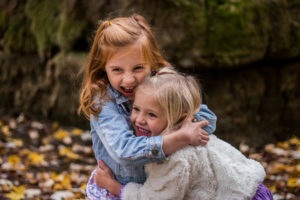
All of our tutors and, in fact, all of our staff have had CPD recognised NSPCC safeguard training because we all want to keep the children we teach safe at all times and that includes being able to spot the signs of any abuse or neglect, as well as any issues that may arise within our sessions. We want all of our students to have the best possible outcome from their lessons and while we think we do a fantastic job teaching music, we also want to do a fantastic job looking after their welfare too!
We chose training with the NSPCC as it is the UK’s child protection agency and its course focused on child protection procedures, detailing how to spot the signs of neglect or abuse and how to respond to any concerns about a child. It was a very interesting process and we all found that the signs we were taught to look out for might not necessarily have been all the signs that we would have thought of. We also found that the added benefit was how to approach and respond to our concerns and how to act around that particular child. Luckily, we have never been put in a situation to use these skills or to intervene with any issues or concerns amongst our students but it’s always best to be prepared.
We’d also like you to know that all of our managers have had first aid training and that this is monitored and renewed when each certificate expires. Thankfully we’ve yet to put it to the test in a real-life situation but we all feel much more prepared knowing what to do.
We’re very proud of the fact that we have such extensive welfare and musical training – we really want to give the best to our students and help them to achieve their best.

Harmeet November 13th, 2017
Posted In: Uncategorised
will October 24th, 2017
Posted In: Uncategorised
will October 24th, 2017
Posted In: Uncategorised
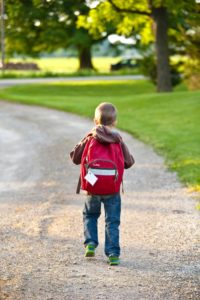
Half term has just begun and I’m sure you’ll agree that this has crept up with alarming speed!
We have really enjoyed teaching old and new students and have learnt new tricks along the way.

We thought we’d end this half term with a few comments from our tutors and students…
“I have learned how to cater to my students’ needs, supporting them in their weaknesses and pushing their strengths.” Says Chris Merton, one of our guitar tutors who teaches at our Bracknell, Woodley and Windsor sessions.
“Next term I aim to get all of students to a
similar level so I can begin to give them more advanced techniques,” he adds.
We love his ambition and also the confidence he has in his students.
One of his Bracknell students, who is only nine years old is delighted he has moved up a group and is looking forward to the challenge of more advanced techniques.
“Chris really helps me to focus on where I put my fingers, which issomething that I often find tricky because they don’t quite reach the right places,” he adds.
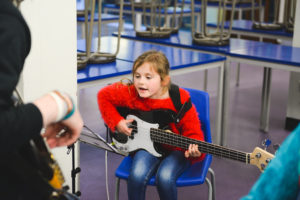
Meanwhile, one of our vocal tutors, Caz Hill, who also teaches in our Bracknell, Woodley and Windsor classes, has a ‘F word Plan’ but don’t worry, it’s not what you think.
“I can sum up the experience of teaching, not just with one F word but with three…. when teaching I need to make sure it is Fun, I need to make sure I am Fair and give each student equal attention and above all I need to be Firm because they will test your limits,” describes Caz.
‘How to make singing fun? I never thought I would have a problem with this, I have always loved singing so it has always been fun but, thinking about it, I was never a nine-year-old boy learning to sing! The pre-teens have so much energy that needs to be channelled, while the seniors are enjoying themselves and are excited to be singing with a band, but are sometimes too cool and desperate for me to think otherwise,” she adds.
Collectively, we always make sure that the lessons are fun, even though they have a structure and focus on different techniques. It’s the principle behind what we do!
We’d love to hear what your children think of their lessons – all feedback is a lesson for us to learn and make sure we are offering the best service possible.
Happy half term!

Harmeet October 23rd, 2017
Posted In: Uncategorised
We’re all about the fusion here are TRP Berks and we love introducing different genres and styles to our students.
Back in the 1980s, for those of us, ahem, who can remember that far back, the Asian Underground scene gave rise to the bhangra music genre, which steadily become more mainstream in the 1990s and 2000s. Do you remember artists such as Apache Indian and Cornershop? Those hip and upbeat songs ‘Boom Shak-A-Lak’ from Apache Indian and ‘Brimful of Asha’ from Cornershop? The genre and other forms of South Asian music began to influence European pop artists such as Björk, Erasure and Siouxsie and the Banshees, who all experimented with South Asian instrumentation, while Talvin Singh, known for his innovative fusion of Indian classical music with drum and bass, subsequently won a Mercury Music Prize for his album ‘OK’ in 1999.
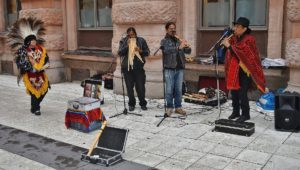
And The Difference Is…?
In simplistic terms, the main difference between classical Indian music and classical Western music is that the former is improvised and the latter is composed, meaning that Indian classical musical is very melodic and free-flowing compared to the more rigid structure of Western classical music.
Indian musicians learn to play raga (patterns of notes) by imitating and memorising. The music is passed on from teacher to student by oral tradition. Students belong to an extended family of musicians learning from a particular master. This is known as the master-student tradition.
Most Indian classical music is based on a combination of rag (melodic form), tal (rhythmic form) and drone (sustained note).
Indian Classical Music is all about ragas. A raga portrays a mood, a sentiment, expressed through a microtonal scale. There are a number of ragas, each with its own mood and its own corresponding microtonal scale that is based on the natural harmonic series – the natural law of vibrations.
Today, Indian Classical music is influenced by a foreign tonal system that is not based on the natural harmonic series. This is the Western tonal system that has had a big influence on Indian Classical music. Many contemporary Indian Classical musicians now make use of Western instruments such as guitar and drums, as fusion between these two genres grows.
So, take as an example the iconic ‘Brimful of Asha’ by Cornershop, which perfectly blends both genres with a twist on the British club music scene using trance beats and the distorted electric guitar, while also bringing in the emotion and referencing both Western and Punjabi languages. A perfect fusion, you could argue, not to mention the use of Indian and Western instruments: sitar, harmonium, keyboards, dholki, guitar and drums.
For us at TRP Berks, the following lines always evoke the meaning that music is the comfort we all need. For those of you who were born in the CD era, ‘45’ is an RPM speed to play 7” vinyl records on!
“Everybody needs a bosom for a pillow, everybody needs a bosom, mine’s on the 45…”
Harmeet October 16th, 2017
Posted In: Uncategorised
For many of us, and particularly as children mature, music can feel like the only outlet. Lyrics and tunes can represent what they are feeling, and at a time when children are changing into young adults they often feel misunderstood, but somehow music gets them, or they find a band or singer they can identify with.
Sadly, music education in the UK seems in decline. This is partly down to the English baccalaureate, introduced in 2010 to boost the number of students studying science and languages. With the UK education system focusing more on ‘purer’ academic subjects, this is very worrying indeed.
There are many hidden costs of a fading music education. There have been many reports highlighting the merits and benefits of music lessons, such as improved brain dexterity, which is important for academic success because of how learning music can stimulate the brain to improve processing and retention. Furthermore, studies stress the importance of music lessons to help build self-esteem and confidence and reduce anxiety. Some studies also suggest that music can help those with dyslexia.
As musical tutors, we see this first hand. We see how our students flourish and gain confidence and self-esteem. We see them engage and interact and thank us for giving them an outlet. We hear from the parents how they are performing better at school and becoming more disciplined with revision and information retention.
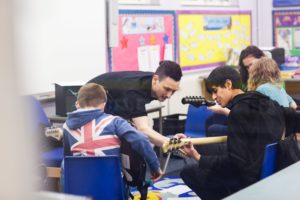
Don’t Waste The Talent
So, it is with such sadness that we watch the education system continue to cut music lessons from the curriculum.
Recent figures from the University of Sussex suggest the number of schools in England offering music GCSE dropped from 85% to 79% between 2012 and 2016. The survey, which spoke to 657 state and 48 private schools across England, claimed the amount of 13 and 14-year-olds given compulsory music lessons fell by nearly 25%.
Michael Dugher, CEO of UK Music, warned BBC’s Newsbeat that future talent could be going to waste because of a drop in the number of GCSE places being offered in England. Worryingly, there is a risk that music lessons will only go to the wealthy and elite, endangering the development of new music, which has historically come from all sectors in society.
It is imperative that children have access to musical education.
The Amazons, who recently had a top 10 UK album after backing from BBC Introducing, said they wouldn’t have been as successful without access to music facilities when they were younger.
“Me and Chris [guitarist Chris Alderton] went to school together,” singer Matt Thomson told Newsbeat.
“We played guitar in the practice rooms in lunchtimes.
“If you don’t have encouragement and recourses, it’s easier to give up. Without them we wouldn’t be here.”
So please don’t give up on music. The benefits are wide reaching and profound.

Harmeet October 6th, 2017
Posted In: Uncategorised

We recently had a lovely comment from one of our students. After a ‘boring’ day at school, he had ‘the best time’ at his Rock Project Berkshire class because ‘there aren’t any tables to sit at and no teacher at the front of the room’.
This got us all thinking at TRP Berks HQ about how we present our teaching…
We do have a very unique teaching style. We purposely did not want students to spend two hours sat down, just practicing an instrument, getting increasingly frustrated and bored. We wanted our students to walk away from a lesson and be able to play all or part of a song. It’s every wannabe rock and pop stars dream to be able to sing or play and instrument, so why not inspire them from the very first lesson? We wanted to create a ‘can-do’ environment, where our students are surrounded by this positivity and see results from the very beginning.
We often compare it to when you learn to drive. While there may be theory tests nowadays, the only way to learn is to actually drive the car! Therefore, the only way – in our opinion – to learn an instrument or to sing is to actually play it! Learn the instrument as you go along and be inspired and motivated after each lesson because you can go home and actually play something recognisable.
One of our nine-year-old students loves the fact that he can play ‘Last Christmas’ by Wham! on the guitar because his mum was a huge fan! Imagine the absolute joy for that boy to be able to play this and the absolute joy his mum has in hearing it. It’s a win-win situation.
We’ve Got The Look
We’re very aware that we have a mobile club and have to adapt to the surroundings and facilities at each different centre or school we use. We do not have the luxury of a permanent venue to decorate and perfect. However, the pop-up-club suits our unique teaching style and shows students and parents what can be achieved at any given venue.
We do try to lay out the rooms in instrument order but also present it similar to how a band would practice. After all, all of our tutors are active members of bands and therefore this layout is how they work. We also want to be present with our students – no desks to create barriers here. We sit with our students, or walk around listening to them, giving them the respect to be heard when they are playing their instrument or singing.
Everything we do is to inspire our students; to empower them with music and this is done in our teaching styles and room layout. Being a pop-up-club gives us the flexibility to change and adapt as our students change and adapt. We’re very pleased to not be classed as ‘boring’!
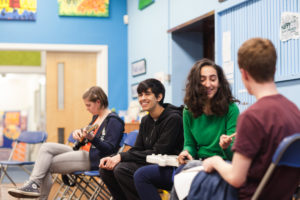
Harmeet September 29th, 2017
Posted In: Uncategorised
. . . Use music to facilitate peace
Music – even in its most primitive form – is a huge part of all cultures and dates back to as far as historians are able to date. It has – and remains – dominant in society and can bring people together, regardless of gender, religion, skin colour, nationality and all the other inane reasons why wars are started.
Music is a way to communicate. It transcends languages – it has no barriers. It expresses feelings and sentiments in ways words often cannot. It can evoke memories and reactions deep inside us. It can provoke calm and it can provoke craziness. It touches our souls.
It bonds and unites humanity. It does not judge. It connects.
There are many common themes in music, notably love, but the horror of war and the longing for peace are long-standing themes.
Many artists use music to express the violence of war, the terror, the injustice, and expose the human waste and destruction, where peace is still longed for. Indeed, music was used in war. The drummer boy marching ahead of the army.
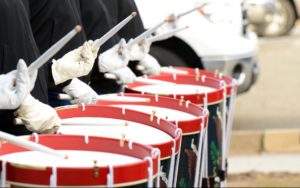
Photo Credit: Gavin Whitner – musicoomph.com
Take, for example, Vaughan Williams’ Pastoral Symphony, which echoes the sense of the lives lost, to the more modern artist such as U2 with Sunday, Bloody Sunday, which again echoes the destruction and waste of war.
But what of peace?
For us at Rock Project Berks, John Lennon’s continual cry for peace stands out. The words which accompany the rich, emotive music of Imagine are still so very relevant today. Particularly in a world where musical events are targeted but where also musical artists and musical lovers unite.
We have written this blog to highlight the connection between music and peace and the power that music has, however, we have kept this purposely short because the focus is on peace.
“All the disorders, all the wars which we see in the world, only occur because of the neglect to learn music.” Molière.
“Imagine there’s no countries, it isn’t hard to do. Nothing to kill or die for and no religion too. Imagine all the people living life in peace…” Imagine by John Lennon

#InternationalDayOfPeace #21September #JoinTogether #WhereWordsFailMusicSpeaks #EmpowerThroughMusic
Harmeet September 21st, 2017
Posted In: Uncategorised
Here at TRP Berks HQ, we’ve had a great first week running our classes and getting back on it! If you knew the discussions that come up in the office – you’d likely join us in laughter and perhaps even cringe with some of the to
pics that come up!

We had a great discussion this week about Roald Dahl and the memories we have of reading his books and our favourite quotes – we did all agree that “If you have good thoughts they will shine out of your face like sunbeams and you will always look lovely” from The Twits was one of our favourite quotes, and of course the “Oompa Loompa” song from Charlie and the Chocolate Factory was one of the funniest songs of his books. However, we also came across a quote from Roald that wasn’t in his books but was one he made about being a writer and one that we all agreed upon and felt a connection with.
“We are the music makers, and we are the dreamers of dreams”
Each of our tutors are music makers and their dream was to be a professional musician – we are so lucky we can say that all of our tutors are professional musicians and that their dreams did come true.
One of our vocal tutors, Naomi Di Cillo, dreamed of being a professional singer and started training from the age of six. She has vast experience in a multitude of singing styles having performed in countless musicals and productions, including Half a Sixpence, Evita, Pirates of Penzance, Guys n Dolls and Calamity Jane at The Hexagon and the lead role in ‘B Is for Black’ which showcased at Southstreet Art’s Centre Reading; and is a L.A.M.D.A grade 8 certified singer/actor and vocal coach with a HND in Performing Arts. Naomi also sings with the Pink Floyd tribute ‘Endless Floyd’ and function band ‘Strictly Commercial’ – a dream come true performing at so many different venues.
Similarly, one of our drum tutors,Mark Vincent, took up drumming at the age of four and began private lessons through the Berkshire Music service from seven years old. At the same time as also taking piano and recorder lessons, drumming quickly turned into a passion through his inspiring teachers Michael Creech and Hamish Stewart. His parents also surrounded him with all the genres a young motivated drummer needs; from Phil Collins, Deep Purple and Buena Vista Social Club, to Yes, Weather Report and Dave Brubeck and his dream to be a professional musician was born! Mark’s band, The Arusha Accord, has had multiple releases through Basick Records and has toured extensively throughout the UK and across Europe sharing stages with Napalm Death, Meshuggah, Tesseract, Sylosis and Architects to name a few. He also graduated in 2015 with a BA (Hons) in Music from Oxford Brookes University, confirming his academic abilities too.

We want our students to feel the same way and nurture their visions. This might be to form a band, be an independent musician or singer, or to be an engineer, a chef or inventor! Whatever this vision is, learning an instrument will give them so many skills, as we have already discussed in previous blogs. The passion and dedication we already see in our students confirms that our teaching style works and that the positive mentoring we provide will create music makers and help dreams come true.
Harmeet September 15th, 2017
Posted In: Uncategorised
« Previous Page —
Next Page »